'More radical than people think'
A conference exploring the legacy of Martin Luther King, 50 years after his death, took place at Highgate Baptist Church in Birmingham on 24 April
The conference aimed to provide a more holistic appraisal of Dr King’s work and assess whether his ministry and activism has relevance for today. It was convened by the Bright Black Forum.
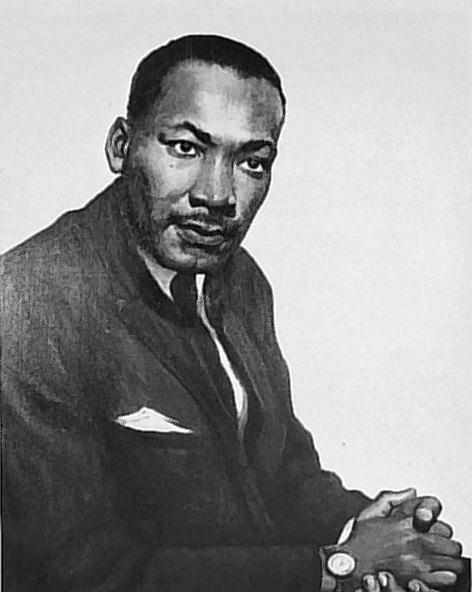
Historical overview
The first speaker was writer and religious commentator Richard Reddie, author of the biography Martin Luther King Jr: history maker. Using his research, he gave an overview of Dr King’s work and legacy, painting a picture of a complex man. He was someone who rarely dismissed ideas, a 'thoroughly charismatic' but 'calm leader', and someone around whom people could coalesce. He kept the black community united.
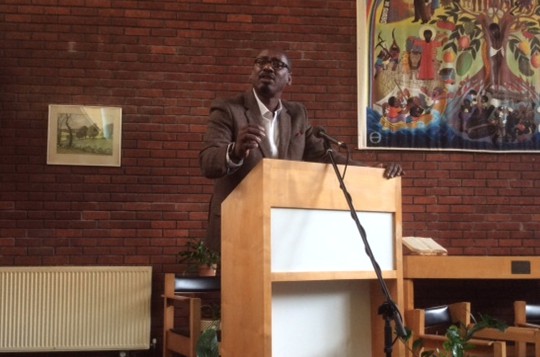
Mr Reddie explained that his campaigns were particularly successful when faced with truculent authorities, such as Jim Clark, police chief in Selma. They would respond with violence, and Dr King recognised the power this had, using the term ‘dramatise’. The ensuing images would scandalise America and led to change.
He was on a left wing arc, and by the end of his life was highly critical of US capitalism. Indeed, said Mr Reddie, his popularity was at an all-time low by 1968, after the highs of his ‘I Have a Dream’ speech five years earlier, due to his stinging critiques of US foreign and economic policy. ‘Towards the end, he was persona non grata.’
Dr King remains a symbol for justice, equality and freedom, but wasn’t at all hung up on his image - and was more radical than people think.
Theological underpinning
Dr Mukti Barton, a scholar in Biblical Studies, explored a theological underpinning to Dr King’s non violent resistance, which, she explained, was influenced by Gandhi, and 'recovered Christianity from Western imperialism'.
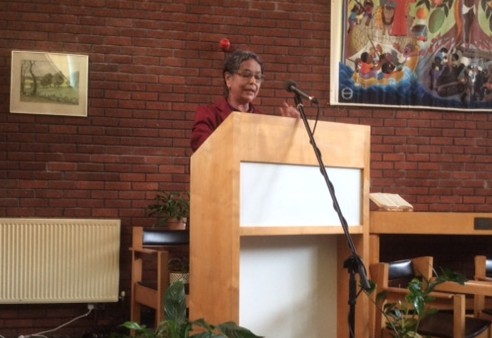
‘King identified a connection between imperialistic nationalism of white America and racism against black Americans,’ Dr Barton said. This connection created an ‘us and them’ division, which King attempted to overcome by insisting that humanity is one.
Dr King identified collective sin as the worst sin, Dr Barton continued. Like Jesus, he lived under imperialistic rule. His non-violent resistance challenged complacency and a do-nothing attitude. Peacemaking is active, not passive, and serves to channel pent-up resentment. It helped to expose the evil of the system.
Non violent resistance helps oppressed people to recover their lost dignity through superhuman activities. It was also practical, as it didn’t give the oppressors what they wanted: it enabled Dr King and his supporters to keep their moral authority. ‘If he had advocated fight, it would have been futile.’ In a similar vein, it also refuses to mirror evil. ‘Hate harms the hated and the hater,’ Dr Barton continued. Dr King understood that the best way of turning someone around was love, ‘making an enemy a friend.’
She added, ‘King’s aim was to kill injustice, not people, and this was biblical, like Paul.’
Historical connections
The Revd Dr Paul Walker, minister of the host Highgate Baptist Church, gave a presentation that explored the historical connection between Dr King and other civil rights pioneers Fredrick Douglass, Peter Stanford and Howard Thurman.
‘Martin Luther King is part of an arc of resistance for racial justice and civil rights that stretched back to the 19th and 18th centuries,’ he said.
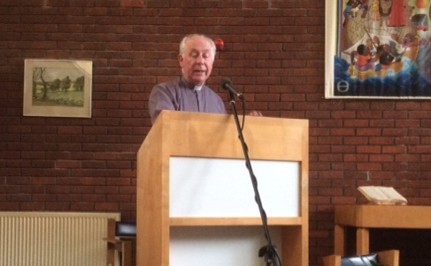
Douglass was a 19th century leader of the abolitionist movement.
Stanford was inspired by Douglass. Born into slavery five years before abolition, he would become Birmingham's first black minister. (He was minister at Highgate, which carriers a blue plaque bearing his name.)
Thurman was an 20th African-American author, civil rights leader and theologian, who mentored Dr King, and whose theology of non-violence was a strong influence on him.
All four men were involved in combatting racist struggles and searching for liberation, said Dr Walker. While there was a variety of methods, there was a similarity between them.
They all criticised ‘slave-holder’ Christianity (reading the Bible and attending church on a Sunday while oppressing others in their daily life) and wanted to highlight hypocrisy. They learned to read using the scriptures, so the use of scripture in their campaigning was 'inevitable'. All were good orators.
Faith, education, literacy and teaching were key, Dr Walker said. All believed the world could be changed by doing good to enemies – which came from Jesus. They all brought a boldness to their campaigning.
Dr Walker said it was now time for a more nuanced, holistic analysis of King’s activism, before concluding, ‘We are at the forefront of this arc of resistance. We have to take responsibility for our actions and share these ideas.’
Non-violent resistance - biblical, or pragmatic?
Theologian Professor Anthony Reddie said that appraising Dr King involved one of the main ethical issues of the church: does violence ever have a part in the redemptive purposes of God?
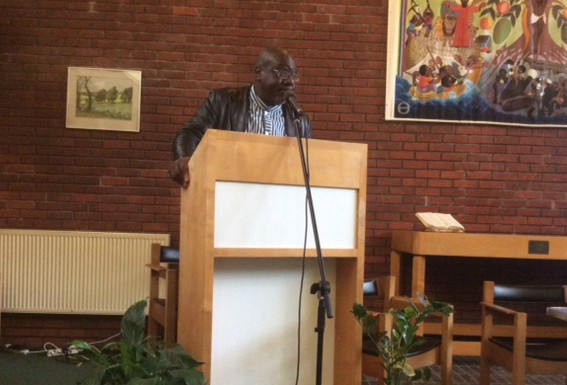
He explained that in the early 1990s when he was a student, Dr King was 'respected but not revered by black theologians'. That Dr King was such an ‘implacable opponent’ of violence was problematic in black theology, for it closed down a potential avenue for change. Hitler was not over thrown by peaceful means, Professor Reddie said.
Dr King was wrestling with a tradition of ‘manifest destiny’ – the way in which people from the US and UK interpreted themselves as God’s people, a belief which stated ‘We know that God is on our side because he gave us an Empire.' He challenged white Christians, and Christendom, and his theological position came from a personal relationship with Jesus, Professor Reddie stressed. It’s firmly rooted in an identity with Jesus as the Prince of Peace. 'You can’t understand King without understanding him as a black Baptist pastor – he is steeped in that.'
But Dr King was also pragmatic, because he believed violence wouldn’t work, Professor Reddie continued - and this remains a challenge for black theologians.
Black Panther and other movements
An afternoon session explored the contribution of the Black Power, Black Panther and other movements alongside Dr King’s non-violent struggle to effect change.
The Revd Dr Chigor Chike, a Church of England vicar based in East London, and chair of the Anglican Minority Ethnic Network reiterated a number of the morning messages. He outlined three areas behind Dr King’s commitment to non-violence.
Firstly, he was determined to avoid a ‘them and us’, a white versus black situation. He did so because he wanted a better world for everyone.
Secondly, he had a vision that justice would prevail. Thirdly, he believed that love, would work most effectively, not hate.
By contrast, Malcolm X recognised, and spoke about, enemies. The Black Panther movement saw their fight purely as freedom from their position of oppression.
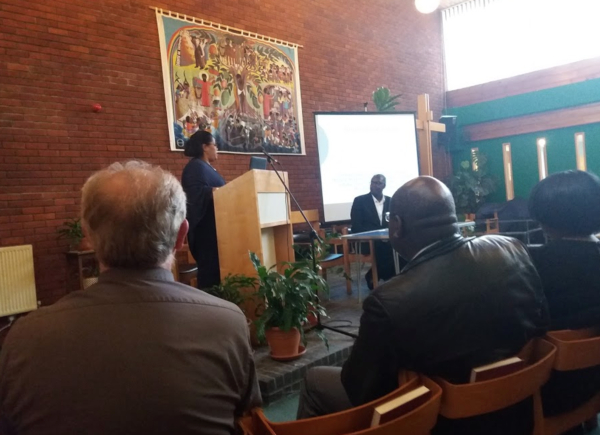
Tessa Henry-Robinson, a womanist Practical Theologian who has written about the Black Power riots in Trinidad and Tobago in 1970, also spoke on this subject. She explained that non-violence was formed in the face of violence, in an era when black people were dying at 'a horrible rate'. It was not appeasement, but 'a set of tools' for the black community.
She said that while Malcolm X wanted change immediately, Martin Luther King had a longer view.
In the question and answer that followed, both were asked whether Dr King’s legacy had been destroyed now that Donald Trump was in the White House, with the support of white evangelicals. Dr Chike responded that Dr King’s legacy is people continuing to hold a long term vision, in spite of attack.
Dr Henry-Robinson commented there were ‘so many legacies,’ not least the dignity Dr King’s campaigning had given to black people. ‘We can say “I am somebody”,’ she commented. ‘That legacy can never be destroyed.’
In the footsteps of Dr King
The final session involved a panel discussion in which selected guests were invited to share how Dr King’s activism was earthed in their contexts.
They included the Revd Dr Carver Anderson, a practical theologian and social scientist who is one of the founders of the Bringing Hope Charity in Birmingham. The charity works to support individuals and families impacted by crime and violence, both perpetrators and victims, and works to break the cycle of criminal lifestyles. In a passionate address, Dr Carver, a member of the Windrush Generation who arrived from Jamaica aged nine, had known violence, both in his earlier life and now in his work to overcome it. He had taken numerous funerals as a result of violence. Holding Dr King’s Strength to Love book in his hand, he said those involved in violence need to know they are loved unconditionally – so many do not know this and are surprised when they experience it.
It is important to be ‘versatile’ in the use of non-violence, Dr Carver continued, but unconditional love, the strength to love, was the key to ‘penetrating the darkness.’
A Windrush Day
The conference took place at the height of the Windrush scandal. Organiser, Baptist minister Kumar Rajagopalan, said it was a ‘tragedy’ that the 70th anniversary celebrations in June would be scarred by what’s happened. He encouraged those gathered to lend their support to a campaign for an annual Windrush Day on 22 June, a day to celebrate the positive contributions made by black, Asian and other minority communities.
‘Without migration, Britain would not be great,’ he said.
Martin Luther King portrait | Public Domain | Wikimedia Commons
Baptist Times, 02/05/2018